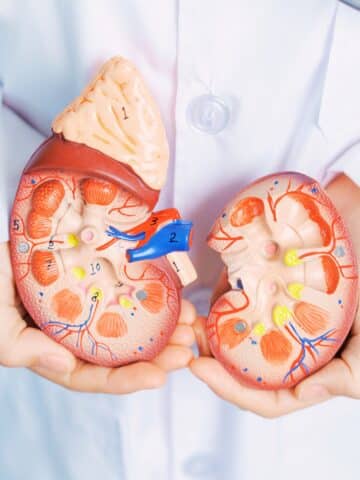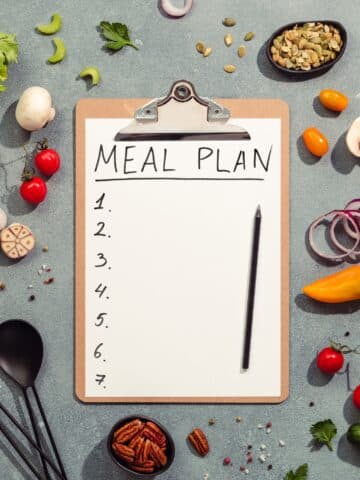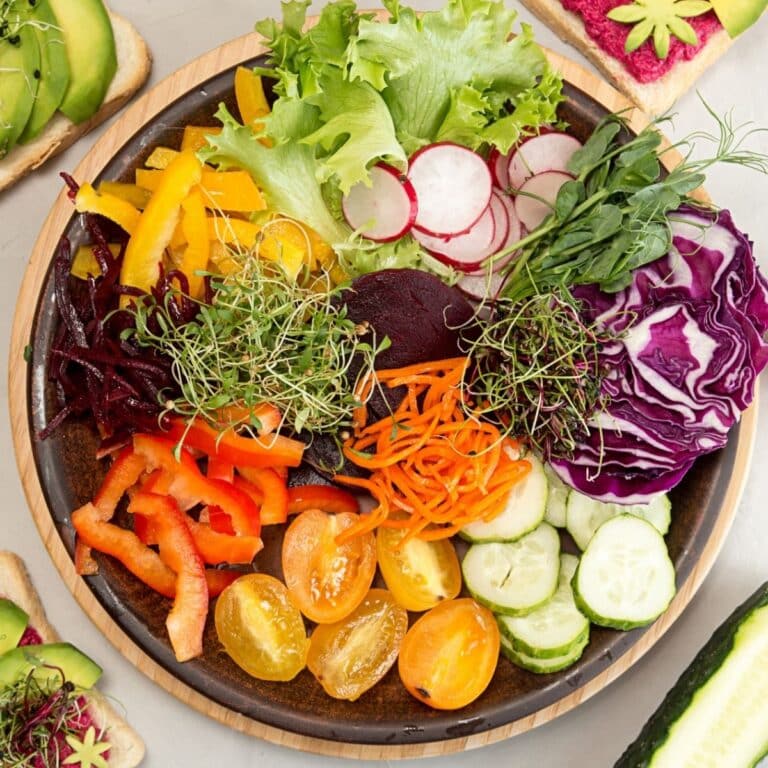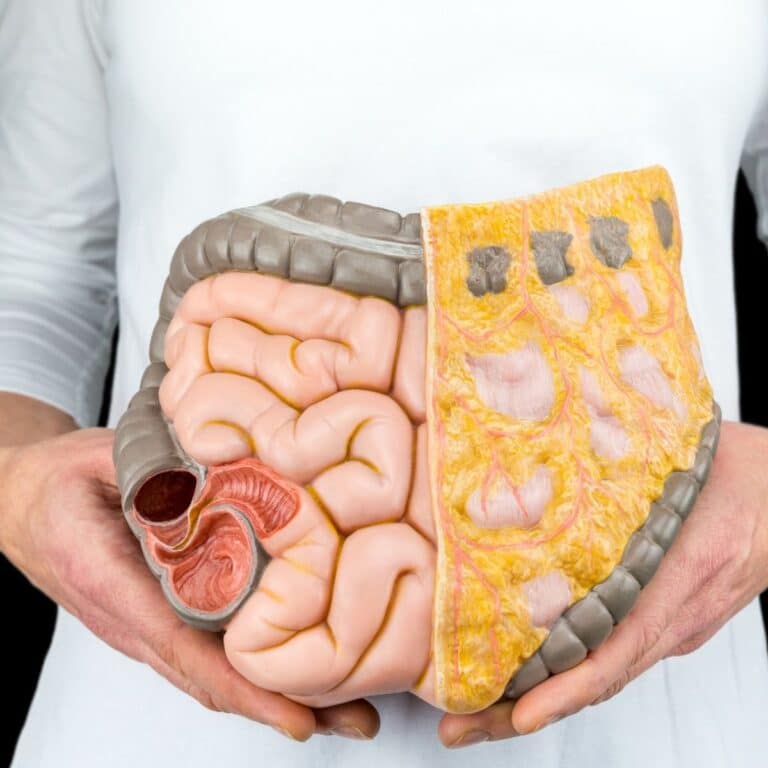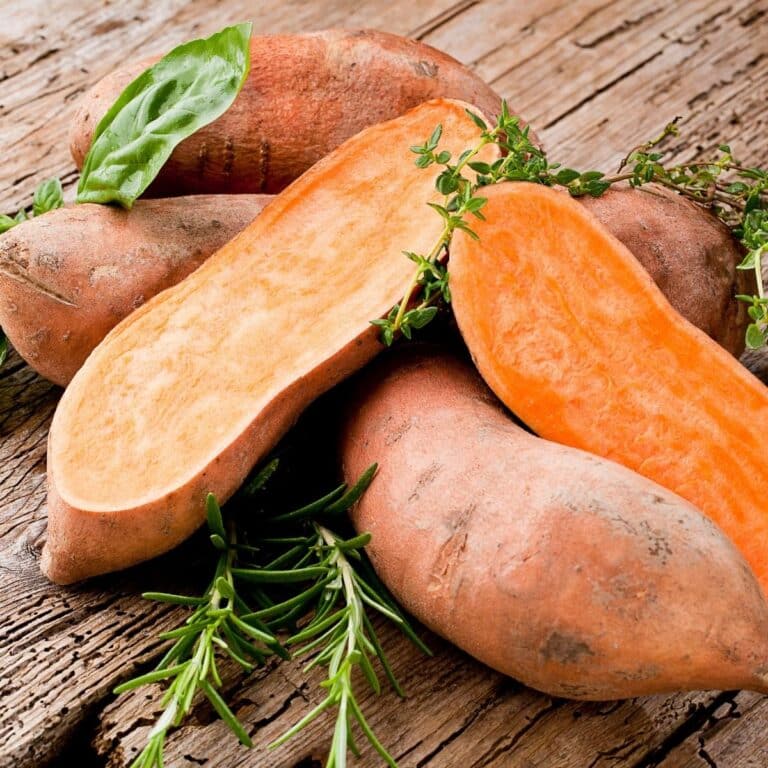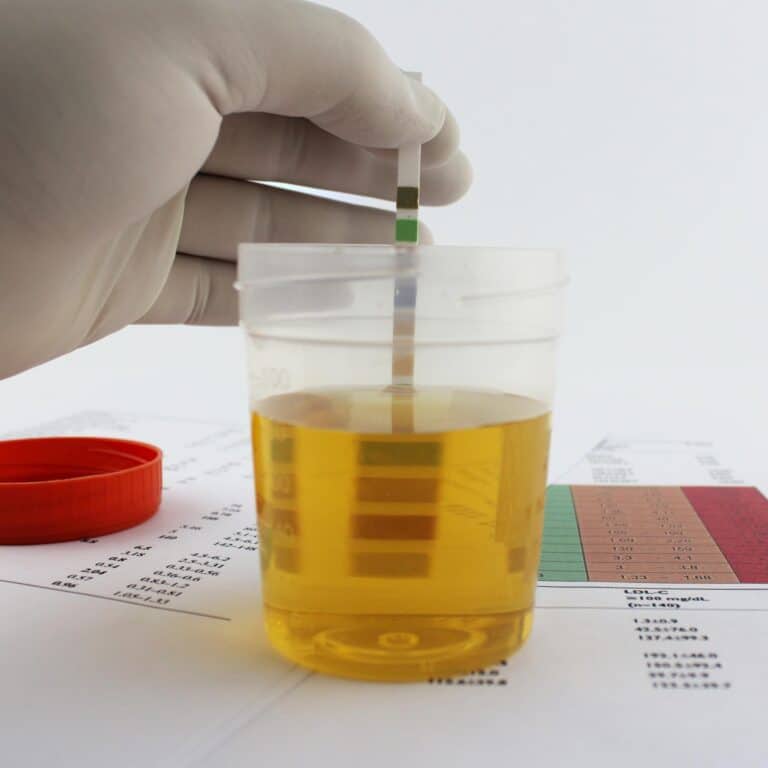What Fruit Is Good For A Renal Diet?
Taking care of your kidneys is critical for optimal health. For those with chronic kidney disease (CKD), a renal diet can be an important part of their treatment plan. Eating the right kinds of food can help manage symptoms and slow down the progression of this condition.
But what fruits are safe to include in such a diet? This article will provide you with information about which types of fruit are good for people following a renal diet.
Eating fresh fruits provides many nutrients, including antioxidants, vitamins, minerals, and fiber contents. However, some varieties have higher levels of potassium and phosphorus than others, making them unsuitable for those on a renal diet who need to limit these elements due to reduced kidney function.
It's essential to understand which types of produce are appropriate so that you can make informed food choices when shopping for convenience foods or preparing meals at home.
Let’s take a closer look at several different types of fruit that may fit into your special dietary needs if you're living with CKD. With this knowledge in hand, you'll be able to enjoy some delicious kidney friendly snacks while taking care of your health!
Jump to:
- Benefits Of Eating Fruits And Vegetables On A Renal Diet
- Low-Potassium Fruits
- High-Potassium Fruits To Avoid Or Limit
- Low-Phosphorus Fruits
- High-Phosphorus Fruits To Avoid Or Limit
- Low Sodium Fruits
- High Sodium Fruits To Avoid Or Limit
- How Much Fruit Should You Eat?
- Tips For Preparing And Eating Fruit On A Renal Diet
- FAQs for Fruit & a Renal Diet
- Enjoy Fruits With Your Kidney Diet
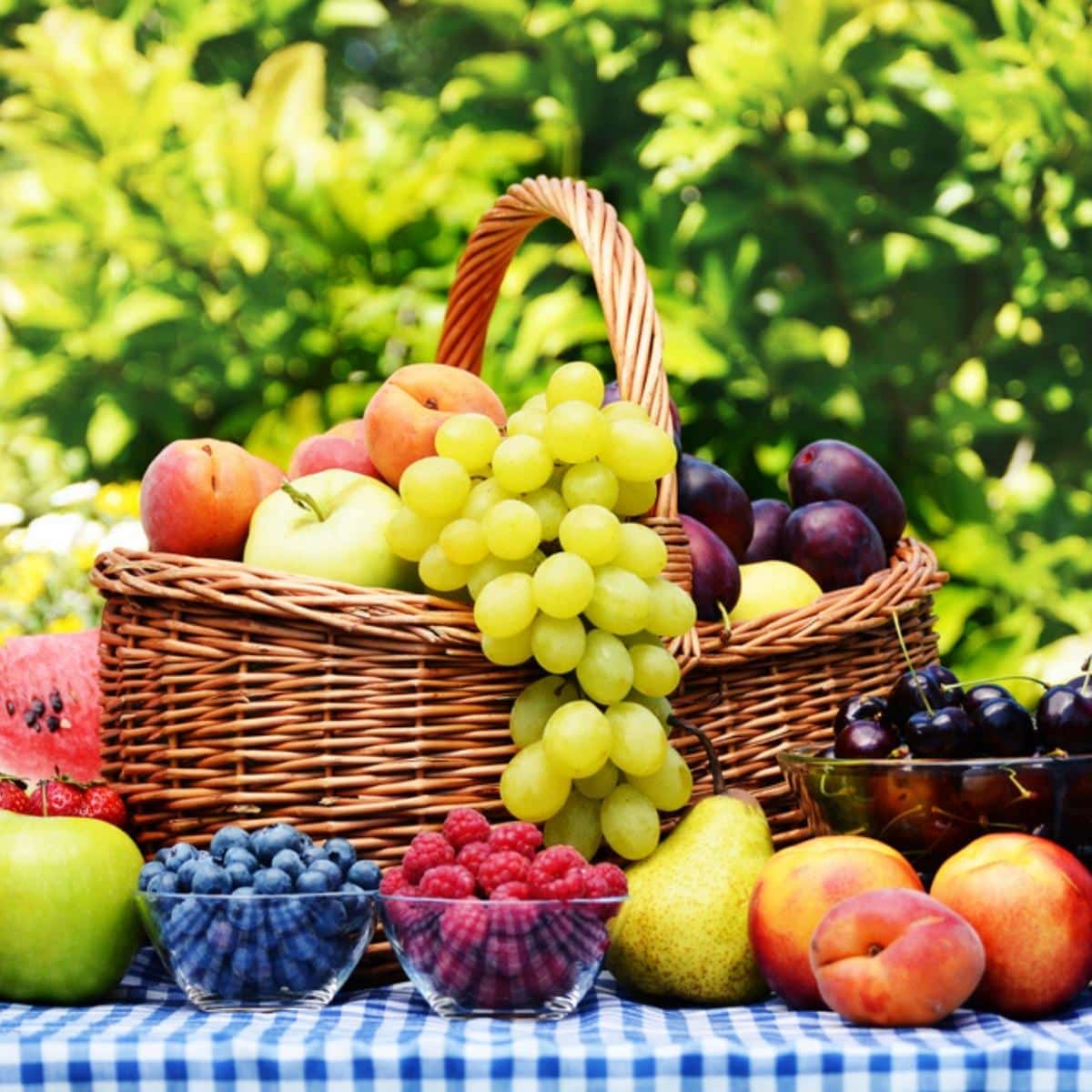
Benefits Of Eating Fruits And Vegetables On A Renal Diet
The benefits of eating fruits and vegetables on a renal diet are undeniable. For people with kidney diseases, following a low-oxalate fruit diet is an important part of maintaining their health and well-being.
Low-oxalate fruits can help reduce the risk of developing oxalate stones, while providing essential nutrients to keep the body functioning properly.
Additionally, increasing one's intake of these nutrient-dense foods can provide extra energy when following a fluid-restricted diet.
Fruits that are particularly beneficial for people following a low sodium kidney diet include apples, oranges, watermelon, cantaloupe and honeydew melon. These low-protein options contain key vitamins and minerals such as Vitamin C and minerals which support healthy blood pressure levels in people with kidney diseases.
Furthermore, consuming fiber from fresh fruits helps regulate digestion and prevent constipation - both common issues for patients on dialysis or undergoing other treatments related to kidney function impairment.
Always check food labels to make sure your fresh fruits and fresh veggies won't exceed your recommended daily allowances of potassium (tips for a low potassium diet) and phosphorus.
Making wise choices about food consumption is especially relevant for those on a renal diet; however it doesn't mean missing out on all the deliciousness nature has to offer!
Eating plenty of fruits and vegetables provides some much needed variety in meal planning while continuing to reap its many nutritional benefits.
So why not try adding some new flavors into your weekly menu? You may be pleasantly surprised at how easy it can be to make positive changes towards better health - starting right now!
Low-Potassium Fruits
When it comes to kidney friendly meals, one of the most important things is to watch your potassium intake.
High amounts of potassium can put strain on the kidneys and cause other health issues. Fortunately, there are plenty of low-potassium fruits that you can enjoy as part of this type of diet.
Did you know that just 100 grams of fresh apples contain only 107 mg of potassium? That's far less than many other common fruits and makes them an excellent choice for people with kidney problems.
Other good options include blueberries (113 mg/100 g), strawberries (153 mg/100 g), tangerine oranges (160 mg/100 g) and plums (168 mg/ 100 g)All these fruits contain significantly lower levels of potassium when compared to foods like bananas and avocados which have around 400 – 600 mg per 100g serving.
Here is a quick list summarizing some benefits associated with consuming low-potassium fruits:
- Low in potassium, making them safe for those following a renal healthy eating plan.
- Full of antioxidant compounds that fight oxidative damage caused by free radicals.
- Contain fiber which helps regulate digestion
- Rich in vitamins A & C & folic acid which boosts immunity
- Excellent sources of manganese
These delectable treats are not only delicious but also provide numerous nutritional benefits that help keep your body healthy - even if you're watching your potassium intake. So go ahead and indulge in some sweet low-potassium fruit today!
For More Recipes and Ideas --->> Get Your Free Meals and Recipes That Are Perfect for Pre-Dialysis Diets, Pre-Dialysis with Diabetes, or Dialysis Diets.

High-Potassium Fruits To Avoid Or Limit
When following a kidney-friendly diet, it's important to be mindful of the amount of high-potassium fruits you eat. Bananas, pineapple, avocados, and dried fruits like raisins should all be avoided or limited due to their high potassium content.
Additionally, cantaloupe is best consumed in moderation as its potassium levels can vary depending on the size of the fruit.
It’s not necessary to cut out every food that has higher amounts of potassium; just aim for keeping your intake within recommended limits (which will depend on individual needs).
Keep an eye on portion sizes when consuming foods with moderate levels of potassium such as apricots and oranges - small servings are usually enough. Apples, grapes, and strawberries are generally considered very safe choices since they have low levels of this mineral.
Remember that eating too much potassium rich foods could lead to health issues including stomach pain, nausea, irregular heartbeat and even kidney failure if left unchecked over time - so always check with your doctor about what kinds of foods are right for you!
Low-Phosphorus Fruits
Now that we know which high-potassium fruits to avoid or limit on a renal diet, let's look at some low-phosphorus fruit options.
Citrus fruits like lemons and limes are great for those with kidney disease because they have just trace amounts of phosphorus.
Are berries high in potassium? Berries such as strawberries, blueberries and blackberries are also low in phosphorus content, making them good choices for any renal diet.
Apples can be enjoyed without worry too, as long as you don't include the peel when eating them. Lastly, grapes provide sweet refreshment while still being relatively low in phosphorus compared to other fruits.
In summary, a renal diet can still include many types of delicious fruit provided they're chosen carefully.
Low-phosphorus citrus, berries, apples, melons and grapes all make great additions to your meal plan!
High-Phosphorus Fruits To Avoid Or Limit
The effects of consuming too much high-phosphorus fruit can be devastating for those with kidney disease. It is important to know which fruits should be avoided or limited when following a renal diet.
With this in mind, let's explore the various types of high-phosphorus fruits that should be either completely avoided or eaten in moderation.
| High-Phosphorus Fruits to Avoid or Limit | Phosphorus Content (mg/100g) |
|---|---|
| Passion Fruit | 61 |
| Avocados | 160 |
| Guava | 104 |
| Pomegranates | 66 |
| Kiwi | 63 |
The table above provides an overview of five different high-phosphorus fruits and their respective phosphorus contents per 100 grams of each fruit.
As such, it is highly recommended that individuals suffering from any type of kidney disorder avoid eating these types of fruits altogether as they will likely worsen existing conditions due to their high levels of phosphorus.
It is also worth noting that even if someone does not suffer from any kind of chronic kidney condition, these kinds of fruits are still best consumed in moderation.
Given their potential health risks associated with them in excessive amounts - especially when it comes to certain medical conditions like diabetes, hypertension and heart disease amongst others.
Therefore, it is wise to consume other lower phosphorus containing fruits instead, including plums, apples, and berries for example - all of which provide plenty of dietary benefits without posing any risk to one’s kidneys!
For those living with CKD, following a low phosphorus foods plan filled with fresh produce can help maintain good overall health and wellbeing despite the challenges posed by this particular diagnosis – allowing them to live life freely and happily!
Low Sodium Fruits
When it comes to renal diets, finding the right low-sodium fruit can be a challenge. Fortunately, there are plenty of fruits that you can enjoy without worrying about your salt intake. Here’s a quick look at some of the best options for those on a renal diet.
When picking fruits, some of the lowest sodium options include apples, oranges, grapefruits, and most berries. In addition to being naturally low in sodium, there are also several options of fruits that have been processed with reduced amounts of added salt or preservatives.
This includes canned fruits, such as pears and mixed fruits, and canned vegetables such as corn and green beans which usually only contain 10 mgs per half cup portion.
Additionally, frozen fruits also have low sodium content which makes them ideal for making smoothies or other desserts while still keeping within recommended guidelines.
By taking advantage of these healthy options, individuals on a renal diet can continue to enjoy delicious fruits without having to worry about going over their daily advised limits.
With careful planning and an understanding of what foods work best for them personally, anyone living with kidney issues will be able to find plenty of tasty treats that don't add unnecessary strain on their body's systems - allowing them to live life fully whilst staying safe from harm.
High Sodium Fruits To Avoid Or Limit
It may seem counterintuitive, but not all fruits are good for a renal diet. While we've discussed several low sodium fruits that can help maintain healthy levels of sodium in the body, there are also high sodium-rich and salty fruits to avoid or limit when aiming for a balanced diet for kidney patients.
Indeed, some fruits contain more sodium than others, with certain varieties being loaded with extra doses of this mineral.
When considering which fruits to include on your renal diet menu plan, it's important to understand just how much higher the amount of sodium is in certain types of fruit compared to their counterparts.
For example, oranges have about 0.1 milligram (mg) of sodium per piece while olives have 5 mg per two pieces - an impressive fifty times difference!
In order to ensure you're getting enough nutrients without any excessive amounts of sodium in your meals, try opting for fresh versions of these foods instead. Berries like strawberries, blueberries, raspberries and blackberries tend to contain very little naturally occurring sodium and provide excellent sources of antioxidants and fiber too!
Moreover, taking advantage of natural herbs like parsley or basil can add flavor to dishes without having to rely on highly processed salts containing high levels of sodium-containing ingredients.
By understanding what constitutes a high-sodium food versus one that is low in this mineral, you can make sure each dish you create satisfies both your taste buds and provides essential nutrition for maintaining proper kidney health.
How Much Fruit Should You Eat?
When it comes to eating fruit on a kidney disease diet, portion control is very important. The amount of fruit per day you should eat depends on your dietary restrictions and individual needs. Generally speaking, the recommended daily fruit intake for those with kidney disease is 1 cup per day or two medium-sized pieces of whole fruit.
It's also important to remember that some fruits may not be suitable for people with CKD due to their high potassium content. High levels of potassium can increase the risk of hyperkalemia, which can cause serious health complications.
So, if you have kidney issues, it’s best to avoid bananas, oranges and other high-potassium fruits altogether.
In addition to paying attention to portion sizes and avoiding certain types of fruits, there are plenty more ways to make sure your renal diet includes enough healthy foods while still adhering to any necessary dietary restrictions.
As always, consulting a healthcare professional prior to making any changes in your diet is advised.
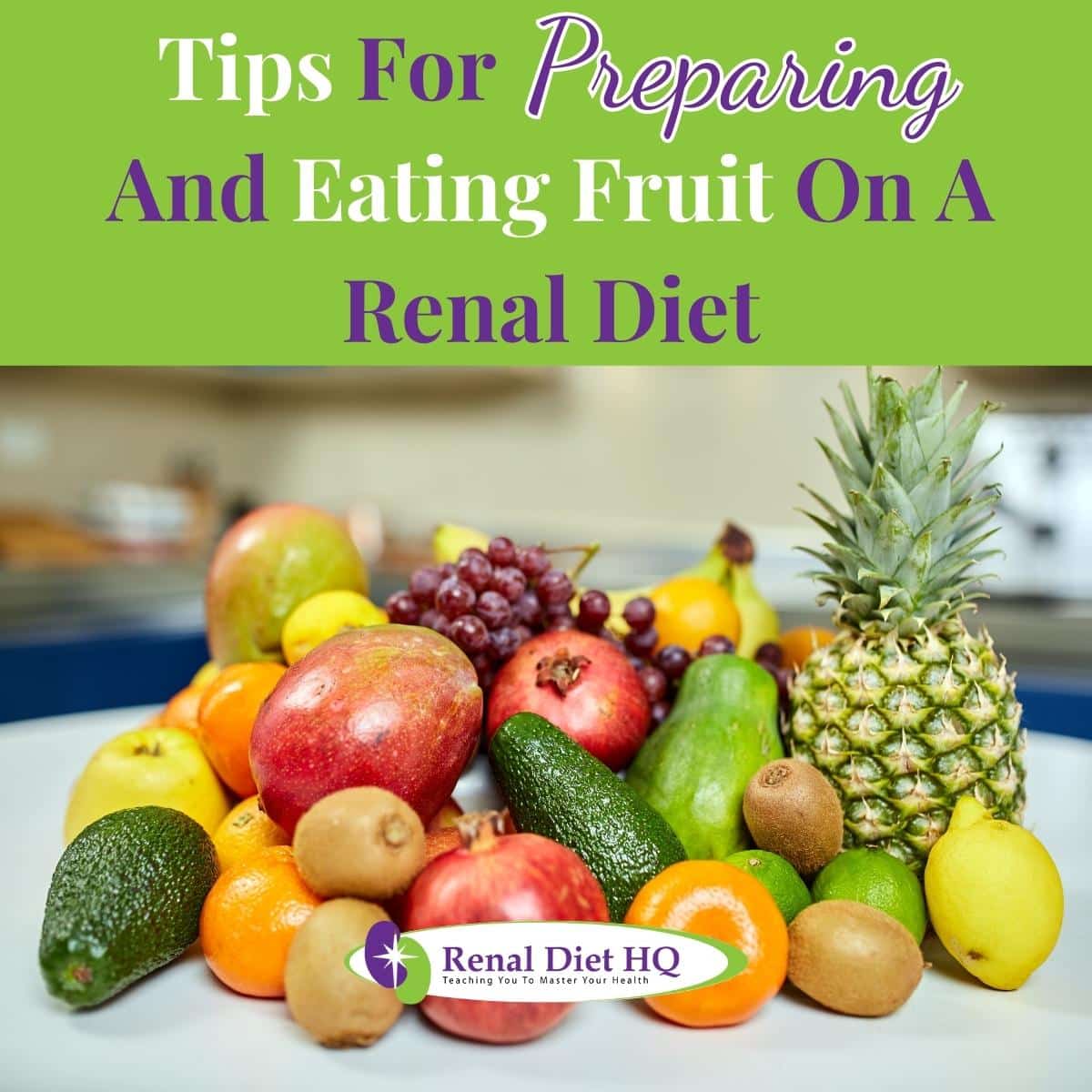
Tips For Preparing And Eating Fruit On A Renal Diet
Fruits are an important part of a renal diet, as they provide essential vitamins and minerals that help keep the body healthy. Preparing and eating fruit on a renal diet can be challenging, but with some careful planning it can be done in a delicious and nutritious way.
Here are some tips for making sure you get the most out of your fruits while still following your dietary restrictions.
Making smoothies for kidney disease is one great way to enjoy nutrient-dense fruit without overloading with sugars. Simply blend together frozen or fresh fruit with low-sodium juice or milk alternatives, such as almond milk or coconut water. This makes for a refreshing drink that’s easy to take on the go!
Packing fruit for lunch is another great option for getting more major nutrients into your day. Cut up apples, oranges, grapes, berries, etc., and bring them along wherever you go. If you have access to a refrigerator at work or school, freezing pieces of fruit also make tasty snacks when thawed later in the day.
When buying organic produce from the store or farmer's market, opt for items that have been grown without any added chemicals or fertilizers - these will provide better nutrition than conventionally grown fruits and vegetables.
Additionally, grilling fruit like pineapple slices makes for a sweet finish to any meal – just be mindful of how much sugar you add if needed!
These simple steps will help ensure you're able to include plenty of delicious fruits in your renal diet while maintaining proper nutrition levels. Eating well doesn't need to mean sacrificing flavor; try experimenting with different recipes and combinations so you always look forward to mealtimes!
FAQs for Fruit & a Renal Diet
Incorporating more fruits into a renal diet can be one way to ensure that this flow remains steady and strong. There are many fresh fruit recipes and ideas that can help with building up an effective renal diet.
From smoothies made from frozen berries and yogurt to salads composed of apples, oranges and pineapple - these delicious dishes provide not only much needed vitamins but also bring aesthetic pleasure in both taste and sight.
In addition, unsweetened fruit juices such as apple juice, grape juice, and cranberry juice offer another option: they contain helpful micronutrients without all the added sugar found in other drinks.
Finally, creating healthy meals does not have to be difficult or tedious; instead it should be seen as something that brings joy rather than burden.
Don’t forget – no matter how small the impact may seem at first – every decision we make today will have an effect on our wellbeing tomorrow!
By exploring different combinations of ingredients you can create nutritious yet tasty meals that appeal even to picky eaters. You can either decide fresh or canned vegetables for a renal diet!
With plenty of options available, anyone looking for ways to incorporate more fruit into their renal diet will find creative solutions right around the corner!
Making sure to stay within the boundaries of a renal diet can be tricky. Many people wonder if they can eat raw fruits and vegetables while on their renal diet.
The good news is that, in moderation, raw fruits and vegetables are indeed part of a healthy renal diet.
Raw produce has many health benefits when eaten as part of a balanced healthy diet. Vegetables and fruits contain vitamins, minerals, dietary fiber, and other helpful nutrients essential for maintaining healthy kidneys and overall well being.
Eating raw fruits like apples or oranges may help prevent chronic diseases such as high blood pressure and diabetes which are common among those with kidney disease.
Likewise, consuming raw vegetables including broccoli or carrots provides antioxidants that may control your level of kidney damage.
Fortunately, there are some easy ways to incorporate more raw fruits and veggies into your renal diet plan.
For example, adding slices of cucumber or carrot sticks to salads can provide additional nutrition without increasing sodium intake; using fresh berries instead of canned fruit in smoothies will boost vitamin levels; and snacking on celery sticks dipped in hummus can add variety to your meals without overloading on carbohydrates.
In order to get the most out of eating raw produce on a renal diet it's important to keep portion sizes reasonable and make sure you're not exceeding recommended daily allowances for potassium and phosphorus – two minerals restricted by most kidney diets due to their potential effects on kidney function.
With careful planning, however, incorporating raw foods into your meal plan can be beneficial for both your physical health and emotional wellbeing! If you have any other questions, you can always take a look at this Comprehensive Healthy Renal Diet Grocery List Guide.
Want to know if you can eat canned or frozen fruit on a renal diet? Well, buckle up my friend – the answer may surprise you. For starters, let's take it back in time to consider the evolution of fruits and vegetables since the dawn of man.
From wild berries hand-picked by our ancestors to store-bought produce prepped for convenience, we've come a long way!
When considering whether canned or frozen fruits are suitable for those with kidney disease, there is no one size fits all answer. Generally speaking however, opting for low sodium options will benefit your health most. Check out these Low Sodium Canned Foods For CKD.
Frozen and canned fruit often contain extra sugar too so make sure that this is accounted for when counting carbohydrates consumed throughout the day. On top of this, aim for variety within your fruit consumption to obtain the required vitamins and minerals from other sources besides just canned or frozen items.
For people looking at a renal diet specifically, it’s important to note that certain types of canned and/or frozen fruits might be off limits due to their potassium content such as banana, avocado and pineapple.
However some lower potassium alternatives like applesauce (without added sugar)(applesauce smoothie), cranberries, peaches and blueberries are generally considered safe in moderation - but ask your doctor for medical advice first!
All in all, aiming for balance between fresh foods plus some occasional use of cans/frozen should help keep you healthy while keeping things tasty too!
Enjoy Fruits With Your Kidney Diet
It's important to remember that if you are on a renal diet, it is essential to incorporate the right fruits into your meals. Fruits can provide essential vitamins and minerals while also helping to increase fiber intake.
With careful planning and monitoring of potassium, sodium, and phosphorus levels in your diet, there is a wide variety of delicious fruit options that can be included with each meal or snack.
Ultimately, ensuring you have an apple here, some blueberries there-all these small steps add up to a healthier lifestyle for those living with kidney disease.
For instance, apples make great snacks as they contain low amounts of potassium but are and excellent source of vitamin C; whereas grapes are rich in antioxidants and have both low sodium and phosphorus levels.
Additionally, canned or frozen fruits are also safe as long as they don't contain added sugars. It should be noted however that some raw fruits may not always be suitable for those on a renal diet due their higher levels of potassium compared to cooked counterparts.
In summing up then, incorporating more fruit into your renal diet does not need to be difficult! By carefully researching which kinds of fruits work best for your individual needs.
Whether it's managing high/low blood pressure levels or simply adding more flavor to dishes - you'll soon find yourself enjoying the many benefits that come with eating fruits for your kidney health! Keep an eye on kidney healthy recipes that you can eat!


